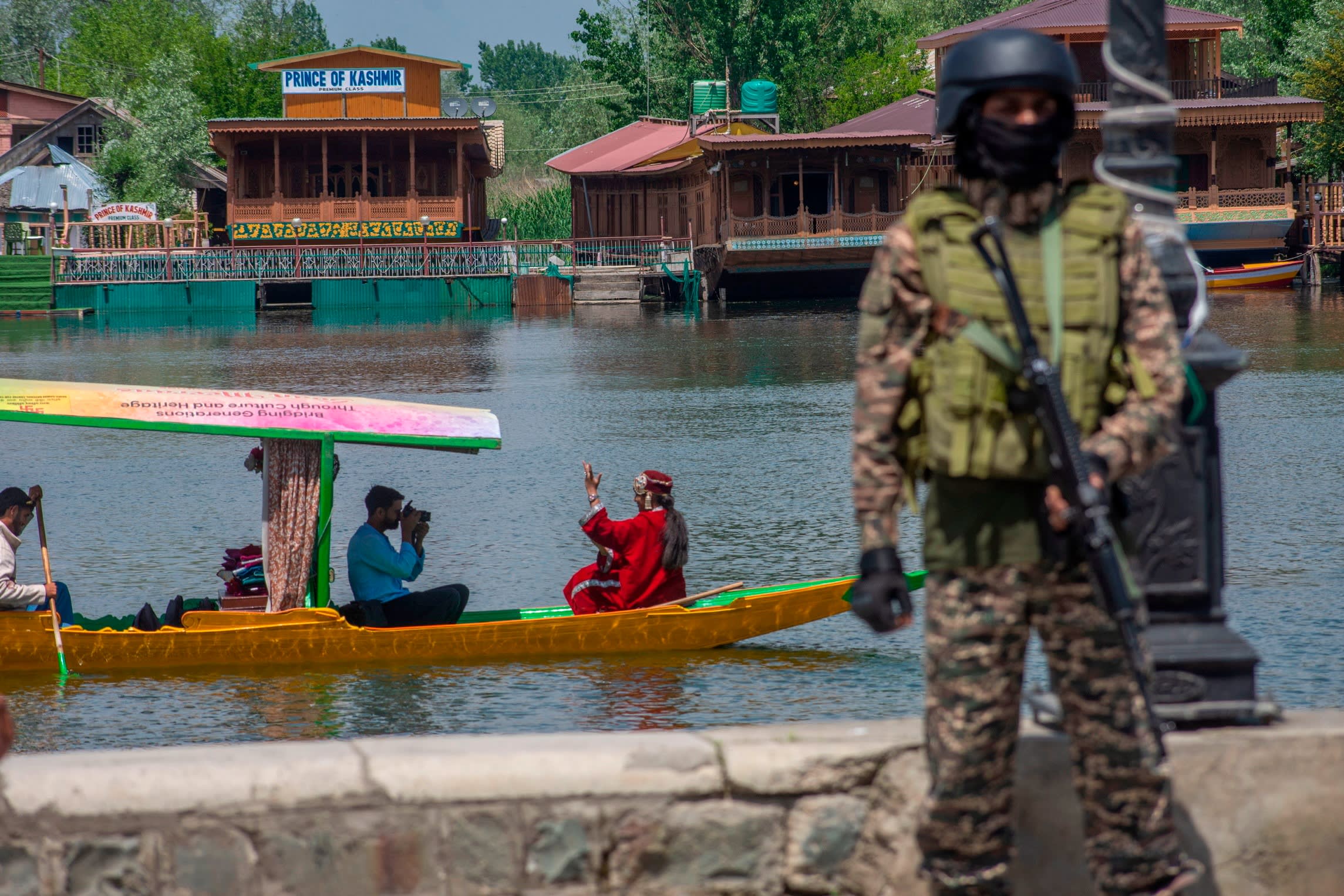On Monday, Girish Sharma, 47, and his wife Prema, 40, were relaxing in the serene meadows of Pahalgam, Kashmir, with their six-year-old son — enjoying a dream holiday in a bustling beauty spot close to the snow-capped Himalayas.
But within a day of the family leaving Pahalgam, gunmen had opened fire and killed 26 people, all but one of them tourists. The attack has prompted shock, grief and anger in India and brought the country to the brink of conflict with Pakistan, which New Delhi accuses of supporting terrorism in Kashmir.
As news spread on social media and television channels, the Sharmas were horrified to see images of bullet-punctured bodies and women and children screaming for help. One particular photograph stood out, that of a young woman named Himanshi kneeling next to the body of her dead husband, a naval officer named Vinay Narwal. The two had wed barely a week earlier.
“How could this happen in such a heavily guarded region?” Prema said, in an interview in the regional capital Srinagar. “We made the plan to come to Kashmir two months ago because people said it was peaceful and normal.”
Indians are now demanding accountability for those responsible for the worst terrorist attack on civilians in India since the 2008 Mumbai attacks, and asking how this could have happened in a region with such a heavy security presence.
India’s Prime Minister Narendra Modi has vowed to exact revenge, saying New Delhi would “identify, track and punish every terrorist and their backers” and “pursue them to the end of the earth”.
“The time has come to raze whatever is left of the haven of terrorists,” Modi declared in a fiery speech in Bihar. US President Donald Trump, French President Emmanuel Macron and Israeli Prime Minister Benjamin Netanyahu were among the world leaders who phoned him to voice their condolences and support.
India and Pakistan both claim all of Kashmir and occupy part of the region, with New Delhi blaming Islamabad for funding and aiding terrorism on its side of the Line of Control that bisects the disputed territory.
New Delhi has said there were “cross-border linkages” between Islamabad and the militants. Police in the India-administered territory of Jammu and Kashmir released sketches of three suspects. Two are Pakistani nationals and one is a Kashmiri.
The police notice named them as “LeT terrorists”, a reference to Lashkar-e-Taiba, the militant group responsible for the Mumbai attacks in which 166 people died.

Already, India has announced it will close its land border with Pakistan from May 1. It has also expelled Pakistani diplomats and suspended a treaty on the Indus river basin under which the two states have shared water since 1960.
Pakistan’s government denies responsibility for the attack and, in response to New Delhi’s actions, has closed its airspace to Indian airlines and suspended a 1972 peace treaty. It described any blocking or diversion of water by India, in contravention of the Indus Water Treaty, as an “act of war”.
The targeting of Hindus in a Hindu-majority country has contributed to visceral public outrage.
The gunmen chose their victims, targeting non-Muslim men, according to two Indian security officials. They shot many in the heads at point-blank range, the officials said, declining to be named because they did not have the authority to speak to journalists.
Anushka Mone, who lost her husband and two other relatives in the attack, told TV channel ABP news that the gunmen “were asking the Hindus and Muslims to stand separately, but nobody responded”, she told the TV station.
Then, when they asked for only Hindus to identify themselves, her brother-in-law raised his hand and they shot him in the head. The Financial Times could not independently corroborate her account.
In India, there has been a backlash against Muslims and Kashmiri youth. Kashmiri students living in at least nine cities outside of Kashmir have either been physically attacked or received death threats from rightwing Hindu groups this week, according to Nasir Khuehami, convener of the J&K Students Association.
The atrocity is being seen as both a national tragedy and a political setback for Modi, who since 2019 brought what many Indians saw as an unruly and violent rogue territory to heel by stripping it of its status as a state and cracking down on dissent with mass arrests.
Since then, violence has fallen and been limited to small-scale “encounters” between separatist insurgents and Indian troops. Tourism, mostly from India, began to bounce back. Cinemas, once targeted by militants, reopened, which was interpreted as a sign that Kashmir could become a peaceful and economically viable part of India.
“By going after the softest of targets, which is tourism in Kashmir, I think the attempt has been to show that these claims of normality are questionable and that things are not as safe and secure as the government would like you to believe,” said Srinath Raghavan, a military historian and former army officer.
At an all-party meeting in New Delhi on Thursday, the government acknowledged there had been security lapses, according to two people familiar with the details.
Tourists fled the Kashmir valley this week, with Indian airlines launching extra flights to ferry people out and inbound flights operating half-empty.
In Srinagar, newly built hotels stand quiet, with the region’s notoriously tight security apparently now even tighter, with police randomly stopping vehicles for document checks. Police released images of two of the alleged militants’ houses being blown up.
Kashmiris have strongly condemned the killing of visitors to the region, and some wondered how the militants could have carried out the attack.
“If Kashmiri people are not involved, then who is behind it?” said Junaid Dar, a hotel employee in Srinagar. “We keep hearing about ‘unknown gunmen’. We want to know who these unknown gunmen are.”


